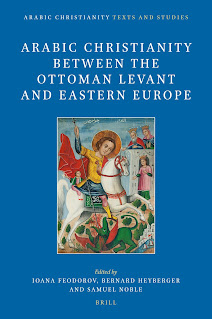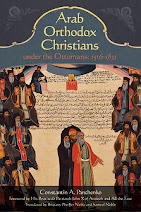Arabic original here.
The Levantine Flavor
Leave aside religions, their teachings and their dogmas when you want to talk about the behavior of their adherents in history. All of them-- without regard for what their holy texts and religious traditions say-- are equal in righteousness or blameworthiness. Most of them subordinate their religious texts to the service of their greed, personal interests, and whims, to the point of making good evil and evil good.
The behavior of believers, especially in social and political matters, is not based on rules rooted in what their texts say, positively or negatively. Rather, it is based on what the interests of secular and religious leaders require. No religious or dogmatic reading of texts can claim neutrality because they are usually forced to take into consideration the inclinations and desires of rulers before issuing rulings or deciding between permissible and impermissible.
The religious reading of texts is not comprehensive. Instead it is selective and does not take into account the various aspects of interpreting any text in terms of justifications, rationales and contexts... Most who desire to support their opinions with religious text simply go to their books and their written tradition in order to select something that gives them additional proofs to support their pre-existing position and ignore what might be contrary to their opinion. So they don't look for what their religious texts are saying to them in all their aspects, but rather only look for what sates their whims and inclinations or what pleases their rulers and patrons.
Religious rulings and attitudes toward them change, even within a single denomination, with the changing of time, governments, and circumstances. The sole constant is dogma and worship. The rest is neither fixed nor essential and is subject to modification. If we take as an example the Crusades, the Latin Church considered them to be holy wars and their legitimacy with support from the Bible and the Christian religious tradition, but now it considers them to have been a historic error for which it must apologize to Muslims...
So we will state once more that Christianity is not one in historical experience, nor is Islam. For this reason we can talk about a historical experience by which Muslims and Christians from the Levant are distinct from other Muslims and Christians, due to a number of considerations:
1) The Levant witnessed the birth of Christianity and its roots go deep into the Levantine consciousness. The roots of Levantine Christianity are for the most part Arab and Aramaean (i.e., Syriac and Assyrian), while Greek culture predominated in the cities due to the Byzantine Empire's dominance at that time. This cultural diversity, alongside the presence of an Arab element and the transfer of the caliphate to Damascus under the Umayyads and a Levantine way of life differing from the predominant way of life in the Arabian Peninsula helped establish relations between Muslims and Christians that are different from relations in other countries and regions.
2) The Levant differs from the Arabian Peninsula, especially the region of Hijaz, the cradle of Islam, where the Christian presence was weak and dominated by scattered groups lacking the culture of the people of the Levant in their various denominations, alongside a predominant Jewish presence, which Islam distinguished somewhat from its view of Christians, or, in the language of Islam, the Nasara.
3) The Levant is that land that has witnessed the most important Islamic and Arab revival over the course of the centuries, since the most important translation movement, for the most part undertaken by Christians, started there and science and philosophy was transmitted from Greek, Persian and Sanskrit into Arabic, causing Muslims and Arabs to be more scientifically advanced than others. The Christian presence at that time was useful for the Islamic state and this lent a sort of Levantine flavor to relations between Muslims and Christians.
4) Over thirteen centuries of Islamic rule, Levantine Christians did not establish their own states and most of them-- particularly residents of cities-- did not fight alongside invaders, particularly the Franks, against the Islamic state. Therefore we can talk about the particularity of Christian-Muslim relations in the Levant.
These are some observations that have permitted us to say that Levantine Islam is different from other Islams, just as Antiochian (Levantine) Christianity is different from other Christianities. For this reason it is not possible to make an analogy on the basis of good or bad relations between Muslims and Christians in one specific geographic region and generalize it to all regions of the world. This is the Levant and this is its true spirit and it will not be ended.
The Levantine Flavor
Leave aside religions, their teachings and their dogmas when you want to talk about the behavior of their adherents in history. All of them-- without regard for what their holy texts and religious traditions say-- are equal in righteousness or blameworthiness. Most of them subordinate their religious texts to the service of their greed, personal interests, and whims, to the point of making good evil and evil good.
The behavior of believers, especially in social and political matters, is not based on rules rooted in what their texts say, positively or negatively. Rather, it is based on what the interests of secular and religious leaders require. No religious or dogmatic reading of texts can claim neutrality because they are usually forced to take into consideration the inclinations and desires of rulers before issuing rulings or deciding between permissible and impermissible.
The religious reading of texts is not comprehensive. Instead it is selective and does not take into account the various aspects of interpreting any text in terms of justifications, rationales and contexts... Most who desire to support their opinions with religious text simply go to their books and their written tradition in order to select something that gives them additional proofs to support their pre-existing position and ignore what might be contrary to their opinion. So they don't look for what their religious texts are saying to them in all their aspects, but rather only look for what sates their whims and inclinations or what pleases their rulers and patrons.
Religious rulings and attitudes toward them change, even within a single denomination, with the changing of time, governments, and circumstances. The sole constant is dogma and worship. The rest is neither fixed nor essential and is subject to modification. If we take as an example the Crusades, the Latin Church considered them to be holy wars and their legitimacy with support from the Bible and the Christian religious tradition, but now it considers them to have been a historic error for which it must apologize to Muslims...
So we will state once more that Christianity is not one in historical experience, nor is Islam. For this reason we can talk about a historical experience by which Muslims and Christians from the Levant are distinct from other Muslims and Christians, due to a number of considerations:
1) The Levant witnessed the birth of Christianity and its roots go deep into the Levantine consciousness. The roots of Levantine Christianity are for the most part Arab and Aramaean (i.e., Syriac and Assyrian), while Greek culture predominated in the cities due to the Byzantine Empire's dominance at that time. This cultural diversity, alongside the presence of an Arab element and the transfer of the caliphate to Damascus under the Umayyads and a Levantine way of life differing from the predominant way of life in the Arabian Peninsula helped establish relations between Muslims and Christians that are different from relations in other countries and regions.
2) The Levant differs from the Arabian Peninsula, especially the region of Hijaz, the cradle of Islam, where the Christian presence was weak and dominated by scattered groups lacking the culture of the people of the Levant in their various denominations, alongside a predominant Jewish presence, which Islam distinguished somewhat from its view of Christians, or, in the language of Islam, the Nasara.
3) The Levant is that land that has witnessed the most important Islamic and Arab revival over the course of the centuries, since the most important translation movement, for the most part undertaken by Christians, started there and science and philosophy was transmitted from Greek, Persian and Sanskrit into Arabic, causing Muslims and Arabs to be more scientifically advanced than others. The Christian presence at that time was useful for the Islamic state and this lent a sort of Levantine flavor to relations between Muslims and Christians.
4) Over thirteen centuries of Islamic rule, Levantine Christians did not establish their own states and most of them-- particularly residents of cities-- did not fight alongside invaders, particularly the Franks, against the Islamic state. Therefore we can talk about the particularity of Christian-Muslim relations in the Levant.
These are some observations that have permitted us to say that Levantine Islam is different from other Islams, just as Antiochian (Levantine) Christianity is different from other Christianities. For this reason it is not possible to make an analogy on the basis of good or bad relations between Muslims and Christians in one specific geographic region and generalize it to all regions of the world. This is the Levant and this is its true spirit and it will not be ended.







